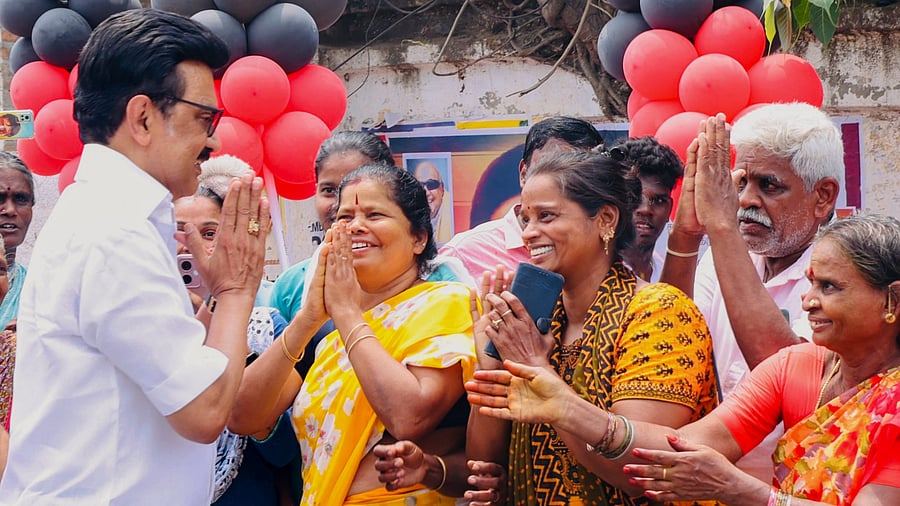
Tamil Nadu Chief Minister MK Stalin greets people as he arrives to inaugurate the Kalaignar Craft Project in Kanchipuram district on Saturday.
Credit: PTI Photo
Chennai: AIADMK general secretary Edappadi K Palaniswami made an unexpected volte-face on March 4. He was categorical that his party’s only goal in the 2026 Tamil Nadu Assembly polls was to "defeat" Chief Minister M K Stalin’s DMK government, for which the AIADMK was ready to align with any political party.
This was a clear indication that the AIADMK, which walked out of the BJP-led National Democratic Alliance in 2023, blaming then state BJP chief K Annamalai, was willing to revive ties with the saffron party.
Until a few months ago, EPS had remained uncompromising in his stand that the AIADMK — which hasn’t won any election since its leader J Jayalalithaa’s death in 2016 — would not ally with the BJP.
The change in strategy stemmed from concerns that if the AIADMK and the BJP form separate coalitions, anti-government votes will fragment, potentially enabling the DMK to secure a historic second straight term.
Palaniswami, who has established firm control over the AIADMK by eliminating every potential challenger such as his one-time bosses V K Sasikala and O Panneerselvam, is under pressure to deliver an electoral victory to sustain his position within the party, and in Tamil Nadu politics.
The shared goal of opposing the DMK is the only common thread uniting the AIADMK and the BJP. A host of parties like the PMK and the DMDK are also likely to join the alliance, which already includes AIADMK rebels T T V Dhinakaran and Panneerselvam.
Under the leadership of Jayalalithaa and M Karunanidhi, who died in 2016 and 2018, respectively, the AIADMK and DMK maintained uncompromising stances against each other, leaving little room for a third significant player.
But the death of these charismatic leaders, internal churnings in the AIADMK and the BJP’s active role have changed the political landscape.
Not just the NDA, even other major players — S Seeman of Tamil nationalist Naam Tamizhar Katchi (NTK) and popular actor Vijay’s Tamilaga Vetri Kazhagam (TVK) — aim to challenge the DMK.
The reason is simple: the anti-DMK vote bank remains sizable. Since the 1960s, the DMK has been the fulcrum of Tamil Nadu politics, with parties either aligning with or opposing it.
AIADMK’s M G Ramachandran and Jayalalithaa cultivated anti-DMK sentiment, reaping substantial political dividends by targeting Karunanidhi personally rather than the party itself. In 2011, Jayalalithaa demonstrated the power of an anti-DMK stance by forming a coalition of ideologically diverse parties united solely by their opposition to the DMK, securing a landslide.
Prof Ramu Manivannan, a former history professor at the University of Madras, put in perspective the importance of DMK in TN politics.
"DMK remains the strongest embodiment of Dravidian politics. It has always set the dominant narrative in Tamil Nadu, with other parties opposing Karunanidhi, even if they align ideologically with the party. The AIADMK thrived by attacking the DMK's first family rather than its ideology," he told DH.
Other parties like the PMK, influential among dominant Vanniyars, have no option but to oppose the DMK. PMK’s hope for an alliance with the DMK won't materialise as long as the VCK, which refuses to coexist with the PMK, remains in the coalition. Meanwhile, the DMDK of late actor Vijayakant has little choice, as the DMK alliance is fully occupied.
Despite lacking Jayalalithaa's charisma, the AIADMK is not only challenging the DMK's dominance but also its status as a leading political force. This is precisely why the AIADMK and the BJP have approached Seeman’s NTK, the staunchly anti-DMK Tamil nationalist party.
The firebrand Seeman has so far insisted on contesting independently.
Add to this, Stalin's growing stature in the national politics with his strident anti-BJP stance grabbing headlines everyday, though it remains unclear whether this will translate into electoral gains.
For the BJP, a DMK defeat would not only weaken the I.N.D.I.A bloc — especially with two other major bloc constituents, Trinamool Congress and CPM, facing elections in West Bengal and Kerala in 2026 — but also diminish Stalin’s influence in national politics.
A win for the AIADMK would help it reclaim its position as the DMK’s primary challenger and elevate Palaniswami's stature.
The underlying message to the AIADMK and the BJP from the 2024 Lok Sabha elections — DMK scored 39/39— was that they cannot pose a serious challenge to the ruling party in 2026 unless they come together. More so, when Vijay aims to take away a significant chunk of the anti-government votes.
Senior journalist Maalan Narayanan told DH that the primary reason every party opposes the DMK is its status as the ruling party. Besides, opposition parties need a "villain", and the DMK serves as a political punching bag.
"The vote share difference between the DMK and the AIADMK-BJP alliance in the 2021 elections was just 5%. Both the AIADMK and the BJP believe that with the support of a few allies, they can close this gap, ensuring it won't be a cakewalk for the DMK," he said.
The future of parties like the AIADMK, BJP, and NTK is at stake, and they face pressure to prove their political mettle. Though their long-term goals differ, their opposition to the DMK unites them, Narayanan added.
In short, 2026 will see a high-stakes contest between the DMK and a fragmented but determined opposition.